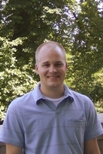
Joel Kilty
Ph.D. 2009, Analysis
Tenure-Track Assistant Professor,
Centre College, Danville, KY
The five years that I spent as a graduate student at the University of Kentucky were both challenging and rewarding. I learned how to become an effective teacher, how to do research in mathematics, and how to balance the different responsibilities of a faculty member. Most importantly, my time at UK prepared me for my tenure-track position at Centre College.
Graduate students in the mathematics department at UK are given the opportunity to teach a wide variety of classes while in school. It is not uncommon for a student to teach a different course, whether as a TA or a primary instructor, most every semester. In addition to being a teaching assistant for Calculus level classes, and a primary instructor in introductory algebra courses, I was given the opportunity to teach several 200 and 300 level courses throughout my time at UK. Being able to teach such a wide variety of courses at several different levels really helped prepare me to be an effective teacher when I left UK. Additionally, we even took a course as a graduate student to help prepare us to be excellent instructors.
The idea of researching in mathematics was somewhat of a foreign concept to me when I began graduate school, and the idea of completing a dissertation that contained new mathematics was extremely intimidating to me. As my coursework came to an end and it was time to begin my research, I found that the transition was quite natural. I completed my dissertation under Dr. Zhongwei Shen and had a fantastic experience. As I look back over the process of completing my dissertation I see how Dr. Shen helped me develop independence as a mathematician, always pushing me to new levels. He encouraged me to publish my work and to travel to mathematical conferences to share my work with others. I now feel confident in my abilities to research on my own and pursue my mathematical interests.
During my final year at UK I conducted a successful job search and I am now in a tenure-track position at Centre College, my top choice in schools. I feel that my experiences at UK made me an appealing job candidate to hiring committees, as well as prepared me for the new challenges and responsibilities that have come my way. I love my new position, and I am very thankful to the University of Kentucky for preparing me so well for this new chapter in my life.
|
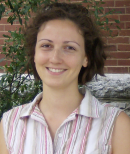
Sonja Petrovic
Ph.D. 2008, Algebra
Assistant Professor of Applied Mathematics
Illinois Institute of Technology
At the end of every big chapter of our lives, we are faced with tough choices. As I was applying for graduate schools, I was overwhelmed by the opportunities that awaited... somehow in the jungle of choices, everyone finds one that seems most appropriate at the moment, chooses it, and hopes that it proves to be a good one for the future. These choices define us in some way. In case of graduate school, this choice defines us as mathematicians. In this sense, I have chosen the perfect Department.
First of all, I came to graduate school torn between a few areas of mathematics and wasn't quite sure how to choose one. So I took classes in all of these areas during the first two years, and have had a chance to meet faculty that were happy to discuss research problems in each area. I was very happy with the choices I had! Also, during these first years I had a chance to read recent papers and work on projects for various graduate courses. These opportunities helped me decide what I want to do and whom to choose as an advisor.
Then, I learned how to teach, and how to balance research/studying with full-time teahing load. It was quite challenging at times, but also very fun. This year I am realizing that one more thing I learned while in graduate school is what a professor's typical workday looks like; and I must say I feel quite prepared for the challenge!
I also had a very special arrangement for a semester or more where I didn't have to teach, thanks to some faculty grants that allowed me to do smaller teaching-related projects, but spend most of the time on research. I am more then grateful for these opportunitites, for these were the first months when my reserach got productive. I was very fortunate to already find a collaborator in grad school: a friend of mine, who started graduate school at the same time at UK. We have already published one paper and are working on another.
And, in terms of research, I had tremendous support not only from my advisor, but also another faculty member from my committee. I always felt like somebody was looking out for me. I always had someone to go to if I had questions about recent papers, where to get references, if I needed someone to proofread my papers, or various research-related statements. In addition, I became really good friends with students a year or two ahead of me in the program, they were wonderful mentors and full of really good advice!
Finally, one of the most important aspect of the last couple of years that I spent at UK was travel. Yes! Travel. To conferences, meetings, various seminars. The University had some funds, but also the Department was very generous with travel support to meetings where I was invited to speak. Of course, these things do not happen overnight; it took a lot of hard work and sacrifice, and also several (in fact, three!) dedicated and understanding Directors of Graduate Studies.
Five years ago, I could not have dreamed what the graduate school experience was really going to be like... but it was everything it could have ever been for me.
|
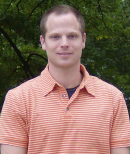
Christopher Frayer
Ph.D. 2008, Analysis
Associate Professor of Mathematics
University of Wisconsin, Platteville
I spent five great years as a graduate student at the University of Kentucky. When searching for a graduate school I had two main requirements: A supportive, cooperative learning environment, and a place with significant teaching possibilities. The University of Kentucky satisfied these requirements and more.
I had a variety of very positive teaching experiences while at UK. As well as having the opportunity to participate in Math Excel, I was the primary instructor for five classes including Calculus I, Calculus III, Linear Algebra and Differential Equations (Along the way, I requested to teach each of these classes and I was granted that opportunity). I found these teaching experiences to be extremely valuable during my academic job search and the beginning of my career as an assistant professor.
The learning atmosphere in the graduate program is both supportive and cooperative. I found the professors to be extremely accessible and more than happy to talk about mathematics. Often times you will find their doors open and them willing to answer questions even when it is not their office hours. During my first year, I met many graduate students who were interested in working together. Not only did we form study groups through out the semester, but when it came time to prepare for the preliminary exams, the study groups continued on.
My advisor, Dr. Peter Perry, was a very important part of my graduate experience. As well as introducing me to mathematical research, being extremely patient, and a wonderful teacher, Dr. Perry was able to provide me with research support for three summers. This allowed me to spend my summers completely emersed in my dissertation, keeping me on track to finish in five years. Finding a great advisor whom is easy to work with is not a unique experience at UK.
I highly recommend the mathematics graduate program to any perspective student. Talk to any graduate student at UK and they will attest to the wonderful atmosphere that is found here.
|
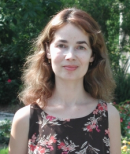
Alina Iacob
Ph.D. 2005, Algebra
Associate Professor of Mathematics
Georgia Southern University, Statesboro, Georgia
Deciding to go to graduate school at the University of Kentucky was probably one of the best decisions I ever made. The faculty is wonderful and the environment is both challenging and supportive. The years I spent in graduate school provided valuable experience in doing research; graduate school was also an excellent teaching experience for me.
My advisor, Dr. Edgar Enochs, introduced me to homological algebra. I became particularly interested in the branch that is called Gorenstein homological algebra and its connections with Tate cohomology. My dissertation was about a generalization of Tate cohomology. I am very grateful to Dr. Enochs for his endless patience, and for encouraging me to publish. I think having a few publications was a plus when I was on the job market. I am very happy for the opportunity to work with Dr. Enochs while I was in graduate school and also after I graduated.
There are active research groups at the University of Kentucky and students are always encouraged to participate in these groups. Giving talks (both seminar and conference talks) is something that I learned in graduate school and which I found very helpful when preparing for interviews.
The Mathematics Department at the University of Kentucky gives its graduate students the opportunity to teach a wide variety of classes at several levels. I taught (as a primary instructor) College Algebra, Trigonometry, Calculus II and III, Linear Algebra, Geometry for middle school teachers, and I was a workshop leader in MathExcel. This experience was a significant advantage in finding a good job in academia and it has proved to be very useful experience ever since I become an Assistant Professor.
My entire graduate experience at the University of Kentucky was a happy and very rewarding one. I could not have asked for a better one.
Alina Iacob, July 2007
|
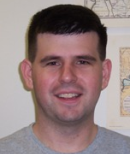
Matthew Menzel
Ph.D. 2004, Discrete Mathematics
Associate Professor of Mathematics
Marietta College, Marietta, Ohio
I imagine that if you were to ask several University of Kentucky mathematics graduate students or alumni why they chose UK, you would get several different answers. I came to the University of Kentucky due to the opportunities available for teaching a variety of courses and because it felt right.
Coming from a small liberal arts college, the transition to graduate school was difficult (actually, I have not come across too many people who find graduate-level mathematics to be easy), and I am confident that I would not have made it through the first two years without the help of my fellow graduate students. Especially in the beginning, we often worked on homework in groups, and I enjoyed getting together on Saturday mornings to study for prelims. When we'd get stuck on a problem, we always could find a more experienced graduate student or professor to point us in the right direction.
I remember two things that the Director of Graduate Studies, Dr. Fugate, told me when I visited UK as a prospective graduate student. He first said that most faculty members relish opportunities to teach graduate courses. I have heard horror stories about graduate students at other schools trying to talk with their professors, but at UK, I don't recall ever wanting to meet with a professor and not being able to do so. Secondly, Dr. Fugate said that the approach he took to recruiting prospective students was to allow them to spend as much time as possible with graduate students. Clearly, the graduate students can offer the most insight into what it's like to study mathematics at UK, and this approach provides motivation for the Director of Graduate Studies to see to the wants and needs of the current graduate students. After all, those who are unhappy will not make good recruiters. As a prospective graduate student, I urge you to talk to as many current UK graduate students as possible and to see how satisfied they are with their experiences at UK.
I cannot imagine a better place to live as a graduate student than in Lexington, and on a personal note, I met my wife while we were at UK (for that, I will be forever grateful). I had the opportunity to teach ten different courses as the primary instructor and to be a MathExcel workshop leader. My goal was to return to a small, private liberal arts college, and the experience that I gained while at UK played a large role in the success of my job search. I am thankful to the University of Kentucky for preparing me to attain the job that I wanted (a tenure-track position at Marietta College in Ohio), and I hope that all prospective graduate students will be as satisfied with their choice as I was with mine.
Matthew Menzel
|
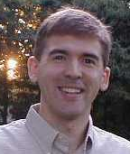
Carl Lutzer
Ph.D. 2000, Partial Differential Equations
Professor of Mathematics and Coordinator of Undergraduate Programs
Rochester Institute of Technology
When I was looking for graduate schools, I knew I was interested in combinatorics and graph theory and that I tended to do well under high expectations in a supportive environment. That's what I found when I visited the University of Kentucky. I wasn't just a number, or one of a thousand students. I was a person, a professional mathematician in training, and the faculty wanted me to succeed.
When I began classes, even though I had been well prepared by my undergraduate education at Michigan State University, I found that the cooperative, collaborative atmosphere of UK was important to my success. Forming study groups was easy, and wandering down the hall to talk with another graduate student or a professor about a problem was expected. Professors' doors were always open (literally) and, if they couldn't talk at the moment, they would always schedule an appointment to see me later.
After a year (or was it two?) at UK, I realized that I was interested in the fields of mathematics that are classically associated with physics, and that led me to partial differential equations. Professors were eager to speak with me about their areas of research, and possible research problems that I might find interesting and challenging. As I worked further and further into my dissertation, Dr. Peter Hislop (my advisor) was a great help to me, as were Drs. Peter Perry, Russell Brown, Ted Suffridge, Chi-Sing Man and Ronald Gariepy. Each taught me something different, and I came away with a wonderful breadth of knowledge.
I was afforded the opportunity to teach many different courses during my time at UK, including College Algebra, Business Calculus, Calculus, Differential Equations, and Matrix Theory. This wealth of teaching experience was very important when I was on the job market, because I knew that I wanted to pursue a career in academia at an institution where I would both continue research and be involved in teaching. Moreover, I was able to bring my experience with the MathExcel (a collaborative learning initiative that targets first year calculus students) to RIT and help restructure how calculus is taught.
I came out of UK with experience in research and teaching, with ideas for research and teaching, and with energy for research and teaching.
Carl Lutzer
|